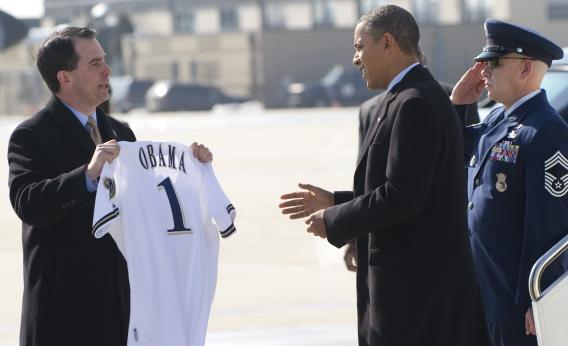Must all politics be presidential?
Tomorrow Wisconsin’s voters will decide whether to boot Republican Governor Scott Walker in favor of his Democratic challenger, Milwaukee Mayor Tom Barrett. Polls show Walker slightly ahead.
Inevitably, pundits have cast it as a “test run” for Obama/Romney. The seemliest have justified their compulsion to connect the two elections by leaning on a quote from Florida Rep. Debbie Wasserman Schultz, chair of the Democratic National Committee, who described her party’s organizing effort in Wisconsin as a “dry run” for the presidential campaign. (Shhh, nobody tell those poor Wisconsin voters that their election is just practice!)
Kind as it is of Wisconsin to offer itself as a bellwether for the benefit of Beltway political hacks, the favor should be declined. The Walker recall is important for plenty of reasons, but its value as a predictor of the national outcome in November is pretty much nil. First, let’s count the ways in which the Wisconsin recall is most similar to the presidential election: 1) It’s an election. 2) A Republican is running against a Democrat. 3) A few of the same national PACs are pouring money into it, and a few of the same state-level organizers are involved. (This, by the way, was the point Wasserman-Schultz was attempting to make when she put her foot in her mouth.)
Now for a few ways in which it’s different: 1) It’s a recall. 2) It’s happening in June. 3) The incumbent is a Republican. 4) Neither Barack Obama nor Mitt Romney is running. 5) A significant number of states (49 by my count) will not be participating. 6) Need I go on?
Drawing inferences about a national election on the basis of a state election is almost always tenuous, but it’s particularly so in the case of a gubernatorial recall, where the main issue is not the U.S. economy, health care, or national security, but the character and specific track record of the individual in office. In Walker’s case, it’s all about his dramatic bid to curb the power of the state’s labor unions. And, as always in recalls, it’s at least partly about whether voters think a recall is the right way to redress perceived political wrongs. Wasserman Schultz’s Republican counterpart Reince Preibus got this right when he told reporters: “There’s a decent amount of Democrats out there in focus groups saying, ‘We’re not Republicans, but we think this recall stuff is out of control. The fact that we have a legislative disagreement with Walker is not justification for this recall.’”
If Barrett pulls out a come-from-behind victory, that will perhaps show us that crossing big labor can still carry a heavy political price in a Midwestern manufacturing state. A Walker win might convince Romney that he has a good opportunity to take Wisconsin if he fights hard there. And for the most serious students of political campaign machinery, like my colleague Sasha Issenberg, the tactics the two sides are using might hold some subtle clues as to how the national battle will unfold. But really, as long as the results are close, whether Walker pulls 53% or 46% doesn’t really tell us much at all—except for that one minor detail of who will govern the state of Wisconsin.
Oh, and for those desperate for some kind of inkling of which presidential voters will choose in November: We could always ask them.
